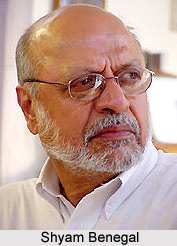 Shyam Benegal is the pole star amidst the cinematic sky of celebrity directors. To quote film critic Derek Malcolm "What Benegal has done is to paint a magnificent visual recreation of those extraordinary days and one that is also sensitive to the agonies and predicament of a talented woman whose need for security was only matched by her insistence on freedom."
Shyam Benegal is the pole star amidst the cinematic sky of celebrity directors. To quote film critic Derek Malcolm "What Benegal has done is to paint a magnificent visual recreation of those extraordinary days and one that is also sensitive to the agonies and predicament of a talented woman whose need for security was only matched by her insistence on freedom."
Shyam Benegal, a prolific Indian director and the originator of "middle cinema" or what cinematic India was to predicament later as New Cinema; was initially involved in the advertising industry. The success that New India Cinema enjoyed in the 1970s and early 1980s could largely be attributed to Shyam Benegal`s quartet `Ankur` (1973), `Nishant` (1975), `Manthan` (1976) and `Bhumika` (1977), which were artistically superior yet commercially viable films. Shyam Benegal did engage talents like Shabana Azmi, Naseeruddin Shah, Om Puri, Smita Patil, Kulbhushan Kharbanda and Amrish Puri to offer that unmatched diction. Benegal has made many sensitive and stimulating films.
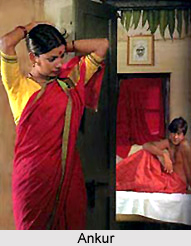 Nephew of Guru Dutt, an Indian film director-producer-actor, was born on 14th December 1934 in Alwal, Secunderabad, which was then a British Cantonment. His paternal grand-mother and Guru Dutt`s maternal grand-mother were sisters. Both are nominally Konkani speaking Chitrapur Saraswats. He graduated from Osmania University and went on to do his diploma from FTII, Pune. He has been the Founder of the Hyderabad Film Society and a former Ad Filmmaker, Benegal made a major impact on Indian Cinema. He has produced over 900 advertisements before his interest turned to films.
Nephew of Guru Dutt, an Indian film director-producer-actor, was born on 14th December 1934 in Alwal, Secunderabad, which was then a British Cantonment. His paternal grand-mother and Guru Dutt`s maternal grand-mother were sisters. Both are nominally Konkani speaking Chitrapur Saraswats. He graduated from Osmania University and went on to do his diploma from FTII, Pune. He has been the Founder of the Hyderabad Film Society and a former Ad Filmmaker, Benegal made a major impact on Indian Cinema. He has produced over 900 advertisements before his interest turned to films.
Shyam Benegal`s film directorial debut was with `Gher Betha Ganga` in 1962. He came into the limelight with his film `Ankur`in 1973. The film is enriched in its essence by a powerful film debut by Shabana Azmi as the maidservant Lakshmi. The film is set in rural South India where a zamindar`s son, Surya, arrives from the city to oversee his father`s estate. Bored and sexually frustrated, he seduces his attractive maidservant, wife of a deaf-mute labourer. The discovery of the maidservant`s pregnancy and the arrival of Surya`s wife who senses her husband`s involvement bring matters to a head. The film is memorable for its gripping details of rural life and its exposure of the feudal system that is brutal and indifferent. `Ankur` not only won several awards including the National Awards for Shabana for Best Actress and Sadhu Mehr for Best Actor, it also had a good showing at the Box Office.
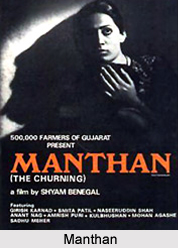 The film `Nishant` tells the story of a teacher`s wife who is abducted and gang-raped by four zamindars and officialdom turns a deaf ear to the distraught husband`s pleas for help. This 1975 released movie starred by Shabana Azmi once again helped to won the national award. In the year 1976 the movie `Manthan` based in part on the White Revolution that occurred in India during the late 1960s and early 1970s. The White Revolution ushered an era of plenty from a measly amount of milk production and distribution. Aside from the great measurable success that this project was, it also demonstrated the power of "collective might". A small set of poor farmers of Kheda district in Gujarat had the vision and foresight to act in a way that was good for the society and not for the self alone. The film set against this backdrop of Gujarat`s fledgling dairy industry. Benegal continued to address the viewer in a strict cinematic language bereft of typical commercial skills. (5 lakh farmers in the state, each of whom contributed 2 Rs, produced the latter film! They came in truckloads to see `their film` once released thereby making it extremely successful at the box office!)
The film `Nishant` tells the story of a teacher`s wife who is abducted and gang-raped by four zamindars and officialdom turns a deaf ear to the distraught husband`s pleas for help. This 1975 released movie starred by Shabana Azmi once again helped to won the national award. In the year 1976 the movie `Manthan` based in part on the White Revolution that occurred in India during the late 1960s and early 1970s. The White Revolution ushered an era of plenty from a measly amount of milk production and distribution. Aside from the great measurable success that this project was, it also demonstrated the power of "collective might". A small set of poor farmers of Kheda district in Gujarat had the vision and foresight to act in a way that was good for the society and not for the self alone. The film set against this backdrop of Gujarat`s fledgling dairy industry. Benegal continued to address the viewer in a strict cinematic language bereft of typical commercial skills. (5 lakh farmers in the state, each of whom contributed 2 Rs, produced the latter film! They came in truckloads to see `their film` once released thereby making it extremely successful at the box office!)
Benegal`s best film perhaps was `Bhumika` that looks at an individual`s search for identity and self-fulfilment. The film is broadly based on the life of well-known Marathi Stage and screen actresses of the 1930s and 1940s, Hansa Wadkar who led a flamboyant and unconventional life to say the least.
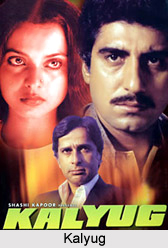 Like most new filmmakers, Benegal has had backers of his films. After the success of these four films, film star Shashi Kapoor with whom he made `Junoon` and `Kalyug` (1981) backed him. The film `Junoon` was set in the turbulent period of the Indian Mutiny of 1857. This is considered as one of Benegal`s most stylish films and which is meticulously detailed and visually arresting. With this film he was much satisfied. The film `Kalyug` which is a complex narrative based on the Mahabharat in spite of some great moments does not quite come off. The film is known as a modern day version of an Indian mythological epic Mahabharata. The characterization and the critical events had a striking similarity with the epic.
Like most new filmmakers, Benegal has had backers of his films. After the success of these four films, film star Shashi Kapoor with whom he made `Junoon` and `Kalyug` (1981) backed him. The film `Junoon` was set in the turbulent period of the Indian Mutiny of 1857. This is considered as one of Benegal`s most stylish films and which is meticulously detailed and visually arresting. With this film he was much satisfied. The film `Kalyug` which is a complex narrative based on the Mahabharat in spite of some great moments does not quite come off. The film is known as a modern day version of an Indian mythological epic Mahabharata. The characterization and the critical events had a striking similarity with the epic.
With the collapse of the New Cinema, in the 1980`s Benegal`s films have not had proper releases and the 1980s also saw him turn to TV where he directed serials like Yatra (1986) for the Indian Railways, and of course one of the biggest projects undertaken on Indian Television, Bharat ek Khoj (1988) a serial based on Nehru`s Discovery of India.
After a gap of almost six years Benegal returned to feature filmmaking and has since been making features regularly but with mixed results, `Suraj ka Saatwaan Ghoda` (1992) and `Samar` (1998) particularly standing out in this period. The former, based on Dharmveer Bharati`s well known novelette, focuses on a bachelor who recounts over two evenings to a group of his friends, the stories of three women who came into his life at different periods of time. Rich in texture, it becomes abundantly clear that more than love stories; they are reflections on shifting social values, indeed an individual`s growing up. `Samar` expertly uses the film-within-film style with ironic humour and self-mocking wit to expose the reality of caste prejudice.
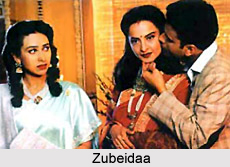 Zubeidaa (2001) with top Hindi film star Karishma Kapoor had its brief moments of its poise and cinematic grandeur. It delineates the story of a woman who led life on her own terms and through the lucid yet placid cinematic moments; the film captures the timeless frames of hope, of rejuvenation and pain languishment. The material that Benegal had to start with had all the elements required to make an extremely engaging film - romance, passion and drama, all reminiscent of his central character in Bhumika but the end result this time was a film that is oddly flat, clinical and mostly boring, a problem that also befell his following biopic `Netaji Subash Chandra Bose: The Forgotten Hero` (2005). Besides Feature Films, Benegal has also made several documentaries including `Child of The Streets` (1967), `Nehru` (1983), `Satyajit Ray` (1984) and `Nature Symphony` (1990).
Zubeidaa (2001) with top Hindi film star Karishma Kapoor had its brief moments of its poise and cinematic grandeur. It delineates the story of a woman who led life on her own terms and through the lucid yet placid cinematic moments; the film captures the timeless frames of hope, of rejuvenation and pain languishment. The material that Benegal had to start with had all the elements required to make an extremely engaging film - romance, passion and drama, all reminiscent of his central character in Bhumika but the end result this time was a film that is oddly flat, clinical and mostly boring, a problem that also befell his following biopic `Netaji Subash Chandra Bose: The Forgotten Hero` (2005). Besides Feature Films, Benegal has also made several documentaries including `Child of The Streets` (1967), `Nehru` (1983), `Satyajit Ray` (1984) and `Nature Symphony` (1990).
He is now making a film, `Mahadev`, an unusual mix of a satire and a romantic comedy set in rural India, starring Shreyas Talpade & Amrita Rao. Mahadev is being produced by Chetan Motiwalla & the shooting will commence in September 2007. Following that Shyam Benegal is directing an epic musical about love, jealousy and betrayal, inspired by George Bizet`s classic Spanish opera Carmen. The story revolves around the eponymous Chamki, a beautiful gypsy girl with a fiery temper and is written by Shama Zaidi. The music is to be composed by the internationally renowned musician A. R. Rahman & lyrics to be penned by noted writer, Javed Akhtar. Chamki, to be produced by Chetan Motiwalla, is in the casting stage & scheduled to go on floor in October 2008.
Shyam Benegal has won the following awards. National Film Awards
* 1975 Second Best Feature Film for Ankur
* 1976 Best Feature Film in Hindi for Nishant
* 1977 Best Feature Film in Hindi for Manthan
* 1978 Best Screenplay for Bhumika
* 1979 Best Feature Film in Hindi for Junoon
* 1982 Best Feature Film in Hindi for Arohan
* 1984 Best Historical Reconstruction for Nehru
* 1985 Best Biographical Film for Satyajit Ray, Filmmaker
* 1986 Best Director for Trikaal
* 1993 Best Feature Film in Hindi for Suraj Ka Satvan Ghoda
* 1995 Best Feature Film in Hindi for Mammo
* 1996 Best Feature Film in English for The Making of the Mahatma
* 1997 Best Feature Film in Urdu for Sardari Begum
* 1999 Best Feature Film for Samar
* 1999 Best Feature Film on Family Welfare for Hari-Bhari
* 2001 Best Feature Film in Hindi for Zubeidaa
* 2005 Nargis Dutt Award for Best Feature Film on National Integration for Netaji Subhas Chandra Bose: The Forgotten Hero
* In the year 1980 Best Director for Junoon.
He was one of the recipients of the honourable Padma Shri Awards in the year 1976, Padma Bhushan Awards in 1991, Indira Gandhi Award in 2004 and in 2006 Dadasaheb Phalke Lifetime Achievement Award. As a person, Shyam Benegal is man with varied interests and curious mind. The sensibility gets reflect in his cinema which have been inspired by India including different facets e.g The Portuguese in Goa in the early 1960`s explored in Trikaal, The final days of Royalty in post colonial India, Rural empowerment in Manthan.






